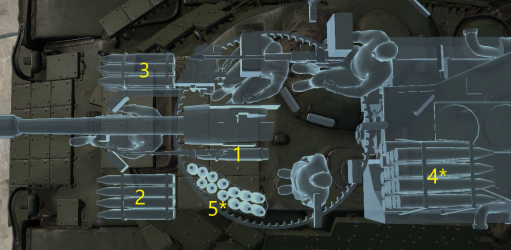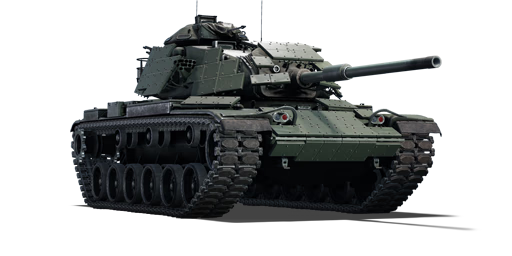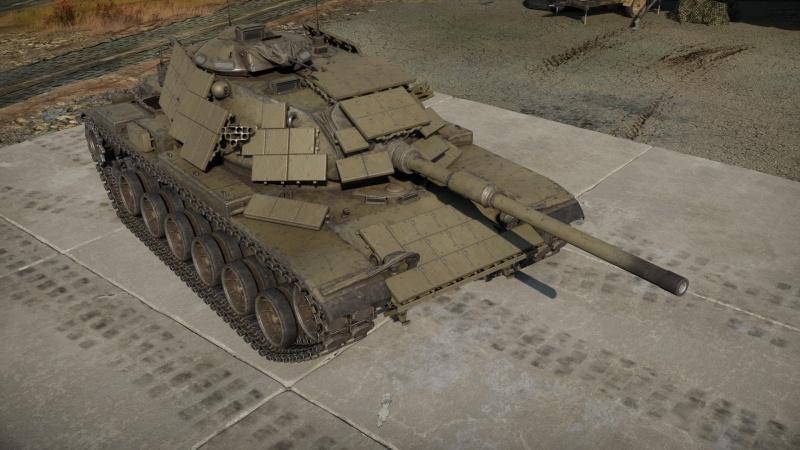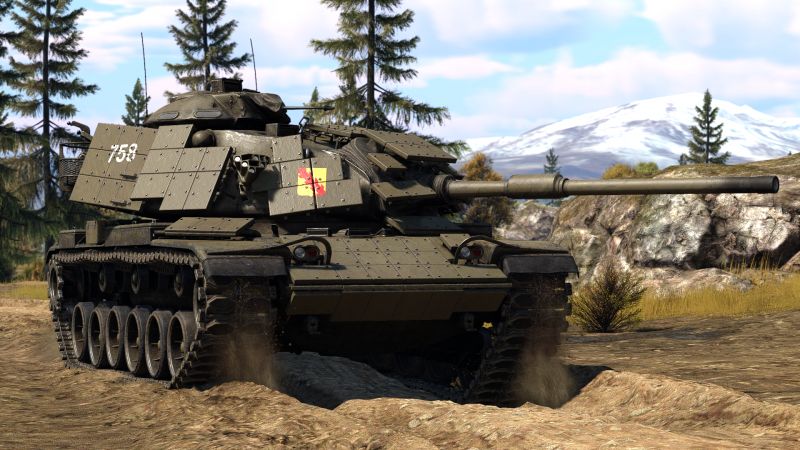Difference between revisions of "M60A1 RISE (P)"
(→Ammunition: Converted to transclusion) |
U149314296 (talk | contribs) m (typo: peek, not peak) (Tag: Visual edit) |
||
| Line 22: | Line 22: | ||
The survivability of the M60A1 RISE (P) is not to be relied upon whatsoever. APFSDS will go through the armour with ease, and high-penetration ATGMs will as well. The only area that is likely to prevent penetration from APFSDS rounds in the mantlet, which is hit or miss. The ERA is only capable of stopping HEAT or HESH shells from penetrating the armour. On the other hand, the HEAT shells may be able to slip between ERA plates to penetrate the armour. Not only that, but the ERA is knocked off after one hit from APFSDS or HEAT, and from multiple hits from machine guns. Once the ERA is knocked off, chemical weapons will punch through the armour with ease. | The survivability of the M60A1 RISE (P) is not to be relied upon whatsoever. APFSDS will go through the armour with ease, and high-penetration ATGMs will as well. The only area that is likely to prevent penetration from APFSDS rounds in the mantlet, which is hit or miss. The ERA is only capable of stopping HEAT or HESH shells from penetrating the armour. On the other hand, the HEAT shells may be able to slip between ERA plates to penetrate the armour. Not only that, but the ERA is knocked off after one hit from APFSDS or HEAT, and from multiple hits from machine guns. Once the ERA is knocked off, chemical weapons will punch through the armour with ease. | ||
| − | Due to the ammunition layout of the tank (storage in the turret and hull), there is a high chance of ammunition explosion after a penetration. Additionally, when the turret is facing forwards three crew are lined up, making for an easy knock-out. One thing to note, the M19 commander's cupola on top of the turret is significantly higher than the rest of the turret. When | + | Due to the ammunition layout of the tank (storage in the turret and hull), there is a high chance of ammunition explosion after a penetration. Additionally, when the turret is facing forwards three crew are lined up, making for an easy knock-out. One thing to note, the M19 commander's cupola on top of the turret is significantly higher than the rest of the turret. When peeking over a hill or cover, the cupola is a viable target for APHE, HE, or HESH rounds, which will splash down through the turret roof to knock out other crew members. Even kinetic rounds such as APFSDS will incapacitate the commander, although they won't do any other damage. |
'''Armour type:''' | '''Armour type:''' | ||
Revision as of 19:17, 2 August 2023
| This page is about the American main battle tank M60A1 RISE (P). For other versions, see M60 (Family). For other uses, see M60 (Disambiguation). |
Contents
Description
The Tank, Combat, Full-Tracked 105-mm Gun M60A1 RISE (Passive) (shortened as the M60A1 RISE (P)) is a rank American medium tank with a battle rating of (AB), (RB), and (SB). It was introduced in Update 1.71 "New E.R.A.".
General info
Survivability and armour
The survivability of the M60A1 RISE (P) is not to be relied upon whatsoever. APFSDS will go through the armour with ease, and high-penetration ATGMs will as well. The only area that is likely to prevent penetration from APFSDS rounds in the mantlet, which is hit or miss. The ERA is only capable of stopping HEAT or HESH shells from penetrating the armour. On the other hand, the HEAT shells may be able to slip between ERA plates to penetrate the armour. Not only that, but the ERA is knocked off after one hit from APFSDS or HEAT, and from multiple hits from machine guns. Once the ERA is knocked off, chemical weapons will punch through the armour with ease.
Due to the ammunition layout of the tank (storage in the turret and hull), there is a high chance of ammunition explosion after a penetration. Additionally, when the turret is facing forwards three crew are lined up, making for an easy knock-out. One thing to note, the M19 commander's cupola on top of the turret is significantly higher than the rest of the turret. When peeking over a hill or cover, the cupola is a viable target for APHE, HE, or HESH rounds, which will splash down through the turret roof to knock out other crew members. Even kinetic rounds such as APFSDS will incapacitate the commander, although they won't do any other damage.
Armour type:
- Cast homogeneous armour
- Rolled homogeneous armour - Engine Deck, Engine Compartment Rear
- ERA
| Armour | Front (Slope angle) | Sides | Rear | Roof |
|---|---|---|---|---|
| Hull | From Top to Bottom: 108 mm (66°) Upper Glacis 128 mm (66°) Upper Center Strip 165 mm (55°) Lower Center Strip 117 - 137 mm (55°) Lower Glacis |
36 - 70 mm | 25 - 40 mm | 20 - 76 mm |
| Turret | 230.9 (curved) Turret Front 76.2 mm (curved) Above and Below Mantlet 127 mm (curved) Mantlet 50.8 mm (curved) Mantlet Perimeter (Overlaps with Turret Face) |
53.8 - 230.9 mm Right Side 49.8 mm - 215.9 mm Left Side |
57 mm | 25.4 - 48 mm |
| Cupola | 35 mm | 26 mm | 30 mm | |
Notes:
- ERA covers nearly the entire front of the hull and turret, and also covers the turret sides (5 mm Kinetic Protection, 370 mm Chemical Protection)
- Cupola Turret Ring - 85 mm
- Turret Ring - 114 + 25.4 mm (Front), 50.8 + 25.4 mm (Sides & Rear)
- Turret Side Armour: Made of ten strips of increasing thickness from front to rear; the left and right sides have different armour compositions
- Right Turret Side Armour from Front to Rear: 230.9 mm, 152.9 mm, 142.0 mm, 128.8 mm, 120.4 mm, 115.3, 105.7 mm, 99.4 mm, 60.5 mm, 53.8 mm
- Left Turret Side Armour from Front to Rear: 215.9 mm, 142.2 mm, 132.6 mm, 116.3 mm, 107.2 mm, 97.5 mm, 89.4 mm, 70.9 mm, 52.3 mm, 49.8 mm
- Belly Armour: 19 mm - 13 mm
- Main Gun: 25 mm
- Machine Guns: 5 mm
- There is a 5.3 mm plate that covers part of the turret face
- Tracks: 30 mm
- Suspension: 20 mm
- Fenders and Storage Boxes: 5 mm
Mobility
| Game Mode | Max Speed (km/h) | Weight (tons) | Engine power (horsepower) | Power-to-weight ratio (hp/ton) | |||
|---|---|---|---|---|---|---|---|
| Forward | Reverse | Stock | Upgraded | Stock | Upgraded | ||
| Arcade | Expression error: Unexpected * operator. | 1,162 | Expression error: Unexpected round operator. | __.__ | |||
| Realistic | 663 | Expression error: Unexpected round operator. | __.__ | ||||
Modifications and economy
Armaments
Main armament
| 105 mm M68 | Turret rotation speed (°/s) | Reloading rate (seconds) | |||||||||||
|---|---|---|---|---|---|---|---|---|---|---|---|---|---|
| Mode | Capacity | Vertical | Horizontal | Stabilizer | Stock | Upgraded | Full | Expert | Aced | Stock | Full | Expert | Aced |
| Arcade | 63 | -10°/+20° | ±180° | Two-plane | 21.40 | 29.65 | 36.00 | 39.81 | 42.35 | 8.71 | 7.70 | 7.10 | 6.70 |
| Realistic | 13.40 | 15.75 | 19.13 | 21.15 | 22.50 | ||||||||
Ammunition
- M728 APDS (Armour-Piercing Discarding Sabot) is capable of easily penetrating the majority of the foes it meets, but these rounds do require finesse as to their placing. Because the shell lacks an explosive filler, the best bet is to try and either knock out the majority of the enemy tank's crew or to destroy the enemy by ammo or fuel detonation through hitting their respective storage capacities. This, of course, requires knowledge about the vehicles the M60A1 may face - so be sure to use the game's X-Ray view in the hangar and analyse the potential foes for their weak spots! Also, keep in mind that with increased armour thickness the amount of shrapnel shrinks.
- M393A2 HESH (High-Explosive Squash Head) works very differently from other shell types. It ignores any angle, except for ricochet and deals damage by metal-flakes which are blown off inside the armour by the exterior explosion. Basically, the fighting compartment is showered in metal rain. Currently, only true armour thickness (as opposed to the line of sight thickness) will provide sufficient means of protection, benefitting the USSR turret designs and in general German tanks. Like all high-explosive shells, the fuse is very sensitive and can be set-off by most objects e.g. fences, trees, pillars.
- M456 HEATFS (High-Explosive Anti-Tank Fin-Stabilised): The knowledge of enemy vehicle layouts gained from the stock shell (M728), will be handy to use for the M60A1's fullest potential - as the M456 is a round that can penetrate most vehicle's armour frontally. Like the APDS shot, increased armour thickness results in a reduced amount of shrapnel after penetration. Unlike APDS it has one downside: Given that it is a chemical energy round, its fuse is highly sensitive in regards to its practical application in battle. As a result, virtually anything, such as trees or even a fence, will set it off prematurely, so the HEAT-FS round cannot fire through obstructions with this kind.
- M416 Smoke
- M735 APFSDS (Armour-Piercing Fin-Stabilised Discarding Sabot)
| Penetration statistics | |||||||
|---|---|---|---|---|---|---|---|
| Ammunition | Type of warhead |
Penetration @ 0° Angle of Attack (mm) | |||||
| 10 m | 100 m | 500 m | 1,000 m | 1,500 m | 2,000 m | ||
| M728 | APDS | 265 | 263 | 252 | 240 | 228 | 216 |
| M456 | HEATFS | 400 | 400 | 400 | 400 | 400 | 400 |
| M393A2 | HESH | 127 | 127 | 127 | 127 | 127 | 127 |
| M735 | APFSDS | 292 | 291 | 284 | 275 | 266 | 257 |
| Shell details | ||||||||||||
|---|---|---|---|---|---|---|---|---|---|---|---|---|
| Ammunition | Type of warhead |
Velocity (m/s) |
Projectile mass (kg) |
Fuse delay (m) |
Fuse sensitivity (mm) |
Explosive mass (TNT equivalent) (kg) |
Ricochet | |||||
| 0% | 50% | 100% | ||||||||||
| M728 | APDS | 1,426 | 4.53 | - | - | - | 75° | 78° | 80° | |||
| M456 | HEATFS | 1,174 | 10.5 | 0.05 | 0.1 | 1.27 | 65° | 72° | 77° | |||
| M393A2 | HESH | 732 | 11.2 | 0.1 | 4 | 4.31 | 73° | 77° | 80° | |||
| M735 | APFSDS | 1,501 | 3.72 | - | - | - | 78° | 80° | 81° | |||
| Smoke shell characteristics | ||||||
|---|---|---|---|---|---|---|
| Ammunition | Velocity (m/s) |
Projectile mass (kg) |
Screen radius (m) |
Screen deploy time (s) |
Screen hold time (s) |
Explosive mass (TNT equivalent) (g) |
| M416 | 732 | 11.6 | 16 | 5 | 25 | 50 |
Ammo racks

| Full ammo |
1st rack empty |
2nd rack empty |
3rd rack empty |
4th rack empty |
5th rack empty |
Visual discrepancy |
|---|---|---|---|---|---|---|
| 63 | 61 (+2) | 46 (+17) | 34 (+29) | 14 (+49) | 1 (+62) | No |
Machine guns
| 12.7 mm M85 | ||||
|---|---|---|---|---|
| Mount | Capacity (Belt) | Fire rate | Vertical | Horizontal |
| Pintle | 900 (180) | 626 | -9°/+60° | ±180° |
| 7.62 mm M240 | ||||
|---|---|---|---|---|
| Mount | Capacity (Belt) | Fire rate | Vertical | Horizontal |
| Coaxial | 6,000 (200) | 941 | N/A | N/A |
Usage in battles
The M60A1 RISE has very special playstyle, which is affected by the lack of speed. While most tanks at this BR are fast, the M60A1 RISE isn't. That is why you should stay between the first and the second front lines, and clean up enemy tanks that try to rush behind your lines. The M60A1 RISE is best played when holding choke points with your great long range gun, and punishing fast tanks like the Leopard A1A1 that try to rush through. With great penetration for all of your shells, no tank should be a serious problem when you shoot at it, and even if you miss a shot, the M60A1 RISE can cover it with good gun reload. Remember, you are not a rusher, advance with your team, cover them when enemy tanks try to get their flanks, and hold angles at important locations.
While the playstyle isn't very versatile, the wide ammo selection can help when a specific ammo type can be helpful. With HESH, HEAT-FS and smoke shells, you can engage any target at any situation, but your main shell is going to be the M735 APFSDS shell, and it should be researched as soon as possible. Until you unlock it, you can use the HEAT-FS, or the APDS shell which is available as stock.
In conclusion, the speed limitation of the M60A1 RISE forces it to play as a second line fighter, use your combat awareness to punish enemy flankers and cover important locations and choke points.
Pros and cons
Pros:
- ERA plates can and will protect you from chemical rounds
- Smoke shells, ESS, and smoke grenades can help you in dangerous situations
- Extremely accurate and fully stabilized 105 mm gun with good muzzle velocity for AP shells
- Good gun depression (-10 degrees) and good gun elevation angles
- Good stock APDS shell
- APFSDS shell with good penetration
- .50 cal machine gun helps against low-flying air targets and lightly-armoured targets
Cons:
- Very large target
- Commander cupola is a tall, noticeable and thinly-armoured weak spot
- ERA coverage has significant gaps, such as the turret ring and roof
- Despite ERA, overall armour is rather poor for the BR
- Very slow, especially when stock
- Tracks are rather loud
- Lacks thermals that most opponents have at its BR
- APFSDS round is a tier IV modification
History
Variants Leading up to the M60A1 RISE
M60A1
Development
In 1960, work was started to upgrade the M60 main battle tank, as the T95 project and the project to create composite armour were closed. The prototypes fitted the T95E7 turret on the hull of the M60. In order to increase the room in the turret for the crew the gun used the M140 mount, which moved the gun forward 5 inches. The first two prototypes (Pilot 1 and 2) were ready in May 1961, and the third prototype (Pilot 3) was ready in June 1961. The prototypes were designated as the M60E1, and they were all built by Chrysler Defense. Pilot 1 was tested at Eglin Air Force Base, Pilot 2 was tested at Yuma Test Station, and Pilot 3 was tested at Fort Knox. The M60E1 was accepted for American service on 22 October 1962. The designation for production M60E1 tanks was Tank, Combat, Full Tracked: 105-mm Gun, M60A1. Production began on 13 October 1962, with an order of 720 units by the Army.
Design
The upper glacis armour of the hull was upgraded from 3.67 inches to 4.29 inches at 65°. The steering wheel was replaced with a T-bar control, and the break and accelerator pedals were rearranged for easier usage by the driver. The tank was upgraded to the Continental AVDS-1790-2A engine and the CD-850-5 cross drive transmission, and it used the T97 track assembly. The first return roller was moved slightly, and shock absorbers were added to the second road wheel pair. The addition of the shock absorbers was due to the increased weight of the armour and new M60A1 turret.
The main feature of the M60A1 was a new turret, which was the turret of the T95E7 medium tank prototype. The new turret had more armour protection, and it also could had more room for the crew, because of the new M140 gun mount. A fume extractor was added to the rear of the turret bustle, on the left side; this would prevent fumes and smoke from accumulating inside the vehicle when the weapons were fired. The loader and gunner received padded seats, replacing the wire mesh seats which were uncomfortable. Ammunition for the main gun was increased to 63 rounds, with 15 rounds in the turret bustle, several rounds in the turret ring, and the rest stored in the hull. The turret was equipped with a new traversing mechanism, and an AN/VSS-1(V)1 IR searchlight was fitted above the gun mantlet. It received the M19 FCS, which consisted of the M17A1 coincidence rangefinder, M10A1 ballistic drive, and the mechanical M19E1 ballistic computer for the gunner. The M60A1 tank uses the M68E1 105 mm gun. The M68E1 gun shared the same firing characteristics as the M68, but had several design improvements including an updated gun hydraulic configuration, a stabilization upgrade for the gun (but not a full stabilizer), a gun elevation kill switch for the loader, an improved ballistic drive, and other component refinements.
M60A1 (AOS)
In 1972, the M60A1 (AOS) was introduced, which gave the tank an add-on stabilization (AOS) system. It was a kit that could be applied to M60A1 tanks with very little modification to the hydraulic gun control system. The AOS allows for stabilization of the gun vertically and of the turret horizontally. This allowed the gunner to track targets and control the gun and turret while the vehicle was moving; this increased the hit-on-the-move capability significantly. Before the AOS upgrade the fire-on-the-move accuracy at 2,000 m was practically 0%, whereas with the upgrade 70% accuracy was achieved. The AOS had three modes: power-with-stabilization-on, power-with-stabilization-off, and manual. Power-with-stabilization-on was the mode which stabilized the gun, power-with-stabilization-off allowed the turret to be controlled electrically when the stabilizer was not necessary, and the manual mode allowed the crew to still traverse the turret and elevate the gun if the electrical or hydraulic systems were inoperable.
M60A1 (AOS)+
M60A1 (AOS)+ is the designation for M60A1 tanks that were equipped with the TLAC, AOS, and T142 tracks. The T142 track debuted in 1974, and it had replaceable rubber pads, improved end connectors, and had a better service life.
M60A1 RISE
The M60A1 RISE integrated the upgrades of the M60A1 (AOS)+ and TLAC, along with new features, and it first debuted in 1975. It featured the improved AVDS-1790-2C RISE diesel engine and CD-850-6 transmission. These parts were more reliable than the earlier types used. A 650 ampere oil-cooled alternator, a solid state regulator and new wiring harness with more accessible disconnectors was also incorporated into the hull's electrical system. Additionally, steel road wheels and return rollers were used, and new, armoured TLAC panels replaced the unarmoured panels. It featured an M32E1 passive sight for the gunner, an M36E1 passive periscope for the commander, and an M24E1 IR night vision block for the driver. The new optical equipment allowed for recognition at longer range and at lower light levels for the commander and gunner. In conditions with only starlight, the optics allowed for vision past 500 m with the use of an IR searchlight. The driver's M24E1 IR night vision block gave the driver second generation night vision capability.
M60A1 RISE+
The usage of the M735 APFSDS round required a cam update to the gun's mechanical ballistic drive in order to allow for accurate firing. With the update the tanks were designated as M60A1 RISE+.
M60A1 RISE Passive (P)
The Passive upgrade for the M60A1 RISE incorporated all the features of the M60A1 RISE+, but with a number of improvements. It was equipped with Kevlar spall liners in the turret, AN/VVS-2 passive night vision block, a deep water fording kit, and brackets for the mounting of ERA armour. It received the improved AVDS-1790-2D RISE engine and CD-850-6A transmission; it was capable of using a vehicle engine exhaust smoke system. The VEESS smoke screen does not protect against infrared, thermal, or laser detection methods, but only obscures the tank visually. In 1978, a kit entered service that installed an M240C machine gun in the coaxial position, and it equipped the tank with two six-barreled M239 smoke grenade launchers (electronically fired), with one mounted on each side of the turret front. The smoke grenades masks the tank both visually and the thermal signature using a phosphor compound.
Media
- Skins
- Videos
See also
- Vehicles equipped with the same chassis
- Other vehicles of similar configuration and role
External links
- [Devblog] M60A1 RISE (P): Explosive Reactive American
- [Wikipedia] M60 tank
- [Tanks Encyclopedia] 105mm Gun Tank M60
- [Military Factory] M60 (Patton)
| Chrysler Defense | |
|---|---|
| MBTs | |
| M48 Patton | M48A1 |
| M60 | M60 · M60A1 (AOS) · M60A2 · M60A1 RISE (P) · M60A3 TTS |
| M1 | XM1 (Chrysler) · M1 Abrams |
| Export | |
| M48 | M48A2 C · M48A2 G A2 · ␗M48A1 · Magach 1 · Magach 2 |
| M60 | ␗M60A3 TTS · M60A1 "D.C.Ariete" · |
| Note | Chrysler Defense was purchased by General Dynamics Land Systems (GDLS) in 1982. |
| USA medium tanks | |
|---|---|
| M2 | M2 |
| M3 | M3 Lee · ▃Grant I |
| M4 | M4 · Calliope · M4A1 · M4A1 (76) W · M4A2 · M4A2 (76) W · M4A3 (105) · M4A3 (76) W · M4/T26 |
| M26 Pershing | T20 · T25 · M26 · M26 T99 · M26E1 |
| M46/47/48 Patton | M46 · M46 "Tiger" · M47 · M48A1 · T54E1 · T54E2 |
| M60 | M60 · M60A1 (AOS) · M60A1 RISE (P) · M60A2 · M60A3 TTS · M728 CEV · 120S |
| MBT-70 | MBT-70 · XM803 |
| M1 Abrams | XM1 (Chrysler) · XM1 (GM) |
| M1 Abrams · M1 KVT · IPM1 | |
| M1A1 · M1A1 HC · M1A1 Click-Bait | |
| M1A2 Abrams · M1A2 SEP · M1A2 SEP V2 | |
| Other | T95E1 |
| Australia | M1A1 AIM |
| Canada | M4A5 |
| Israel | ▃Magach 3 (ERA) · ▃Merkava Mk.1 · ▃Merkava Mk.2B · ▃Merkava Mk.3D |
| Turkey | M60 AMBT |






